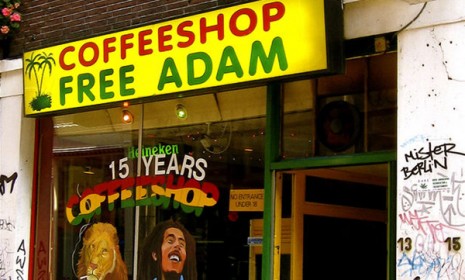Will banning marijuana sales to foreigners hurt Holland's economy?
Dutch weed may be getting more exclusive thanks to a rule barring international tourists from patronizing the country's pot-selling cafes

A free daily email with the biggest news stories of the day – and the best features from TheWeek.com
You are now subscribed
Your newsletter sign-up was successful
A Dutch judge on Friday upheld a plan to bar foreigners from the country's famous cannabis cafes. The government says it has to clamp down to keep the country, especially border towns, from being overrun by tourists who stream in just to buy drugs. A lawyer for the nation's 680 pot-selling coffee shops vowed to appeal immediately, saying the ban would devastate the businesses. Is Holland sabotaging its own economy by going harder on soft drugs? Here, a brief guide:
Will the ban shut down the coffee shops?
No. It would just make it illegal for the cafes to sell marijuana or hashish to foreigners. Under the new law, which takes effect in three border provinces on May 1, the coffee shops will essentially become private clubs for Dutch adults only. The ban is scheduled to be enforced nationwide on Jan. 1, 2013. Customers would have to register, and they'd get a "weed pass" telling clerks it's okay to serve them. But the Dutch Cannabis Retailers Association says that's ultimately a death sentence for its members.
The Week
Escape your echo chamber. Get the facts behind the news, plus analysis from multiple perspectives.

Sign up for The Week's Free Newsletters
From our morning news briefing to a weekly Good News Newsletter, get the best of The Week delivered directly to your inbox.
From our morning news briefing to a weekly Good News Newsletter, get the best of The Week delivered directly to your inbox.
Why?
Pot-smoking tourists are their bread and butter. "It is going to cost me 90 percent of my turnover," Michael Veling, a spokesman for the association, tells the BBC World Service. And coffee shop owners expect they'll lose Dutch customers, too, because they'll be required to register to buy a substance that is still, technically, illegal, even though licensed cafes have been allowed to sell small quantities since 1976. As a last resort, the cafe owners plan to take their case to the European Court of Human Rights, and argue the government shouldn't be allowed to discriminate against customers based on where they live.
How much will this cost the Dutch economy?
A lot. The mayor of Amsterdam, Eberhard van der Laan, understandably opposes the ban: Roughly a third of the four million foreign tourists who visit the city each year smoke marijuana in the local coffee shops. Ten percent of tourists who visit Holland do so exclusively for the pot. The cafes do $2.6 billion in business a year, generating $503 million in tax revenue.
A free daily email with the biggest news stories of the day – and the best features from TheWeek.com
Why is the government shutting all this down?
The conservative-led government elected 18 months ago is sick of the country's reputation as a haven for drug tourists. The city of Maastricht, bordered by Germany and Belgium, was being overwhelmed by tourists driving in strictly to buy marijuana. And production for the cafes led to a thriving black market, turning Holland into a major drug supplier for the rest of Europe, Ard van der Steur, a Parliament member and a spokesman for the ruling People's Party for Freedom and Democracy, tells The New York Times. "We have created an incredible criminal industry that we need to get rid of."